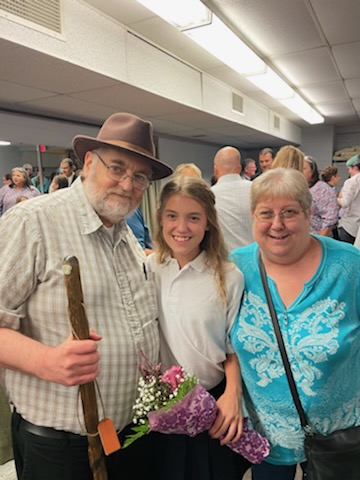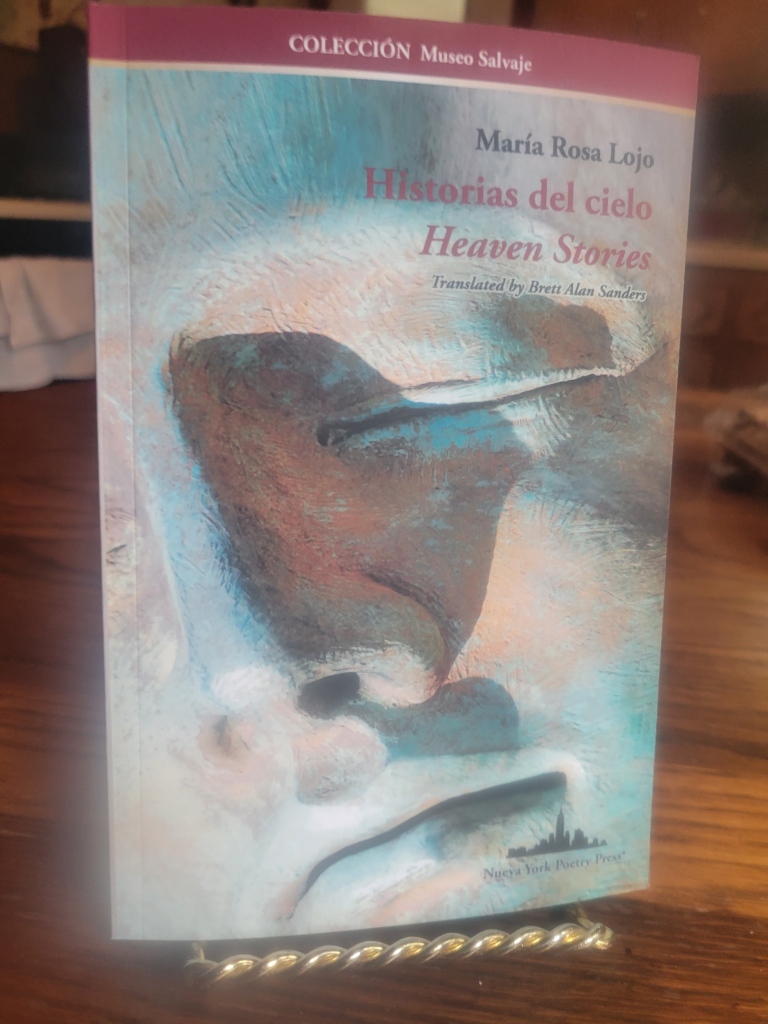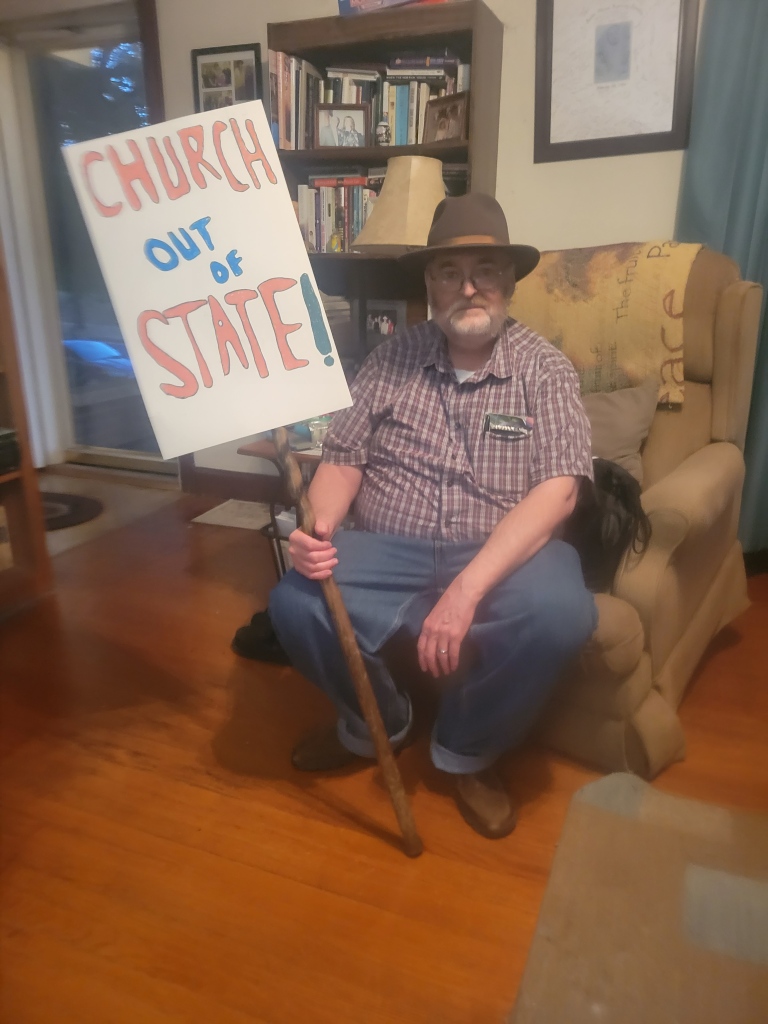
The evening of Thursday, July 21 was one of the truly joyous moments in my life as an old-geezer slash retired-school-teacher. It was the opening night of the Actors Community Theatre’s production of Roald Dahl’s Matilda: The Musical, at the Jasper Arts Center in Jasper, Indiana. It featured, in one of the ensemble roles (anonymous children at Miss Agatha Trunchbull’s school of horrors), Anita’s and my granddaughter Adria’s theatrical debut.
Need I say that Adria – who just turned thirteen and had been thwarted from a singing part in her school’s planned spring 2020 performance of Jack and the Beanstalk, by the emergence of, you guessed it! the Covid pandemic – was absolutely brilliant in her performance?
I know I am a biased reporter, but in my years as teacher, writer, and literary translator, I think I’ve developed the critical skills – like Cervantes with his “misbegotten” child, Don Quixote, as he quipped in the introduction to Book One – to recognize an only adequate or even poor performance from a relative of mine.
As when Anita, who when she sang more than she does these days, would occasionally strike a flat note (as I would kindly point out in our practices), though the fault was clearly my mediocre skills as an accompanist on the guitar; when supported by more competent musical artists, she was always spot on. She stole the show at her five-year high school reunion when she asked the band if she could sing “Proud Mary”; skeptically, they said yes, and were then amazed at her professional performance.
Then there was Jonathan, my not-at-all misbegotten son, now a pretty decent writer and music journalist. But in my Spanish class he perfected the art of sleeping with head up and eyes open (I would always call on him at such moments and enjoy, with the rest of the class, his startled awakening). He took home B’s and later, C’s, proving that the teacher’s kid does not always get the high marks. Though my daughters’ more envious classmates still assumed that their A’s were the product of paternal favoritism.
But I digress.
Adria, in any case, performed with apparent ease and confidence and even delivered her one spoken solo line with all the Adria attitude that the role required and that we have become so familiar with. Nadina, who had been present as a parent assistant, says that Adria was at first shy but gained confidence through the almost nightly practices over the weeks preceding her public debut. She occupied her role quite convincingly, performing all of the choreography with precision and belting out the group songs with her companions, no sign of her previous shyness or anxiety.
But, speaking of Cervantes and his misbegotten child, I must mention the completely unexpected incident that made the night more remarkably joyous than could even have been anticipated. First, to orient those of you who aren’t familiar with Roald Dahl’s highly literate and witty children’s books (which were richly appreciated as much by me and Anita as by our children), a brief sketch of Matilda’s storyline:
Matilda is something of a child prodigy, who while growing up in the home of parents supremely ill-equipped to appreciate her gifts, has taught herself to read … and to read the Classics! … before starting school. Her favorite book is, improbably for a kindergartner or even first-grader, Moby Dick. Her father, Mr. Wormwood, is an ethically challenged used-car salesman who changes his phone number, every so often, to keep ahead of customers he’s cheated; and Mrs. Wormwood is in the thrall of fashion, beauty and fitness, and TV culture. To them, Matilda is a misbegotten “bookworm,” incomprehensible and embarrassing non-entity. Then at school there is the ridiculously demoniacal Miss Trunchbull, tyrannical headmistress, to deal with. But it is also at Trunchbull’s school that she meets Miss Honey, her teacher and champion. Between the two of them, and a bit of necessary magic, they become more than a match for the evil Trunchbull.
So, back to the story of my incomparably joyous evening. After the intermission, the uncommonly (?) thick-headed Harry Wormwood, who plans to get rich by his schemes, who has no use for his daughter the bookworm, comes out in front of the curtain to harangue his audience about the madness of reading in the age of this great wonder called TV.
(Okay, so this was written before the computer age.)
How many of you, he asks, have read a book?
I was one of those ingenuous souls who dared raise my hand. Seated in the middle section, a bit to my left of the short row of four chairs in the front row, I was an open and easy target. So he points to “the guy in the checkered shirt” (I had to look down at mine to confirm that he might mean me) and asked my name.
Brett, I said.
What? (I am a bit soft-spoken.)
Brett (a bit louder).
Still can’t make it out; or so he said, he was clearly going to come down anyway. So now he’s standing in front of me.
So, he asks, of all the books you’ve read, what is your absolute favorite.
Of course, everyone in my family who was present knew what I was going to say. Even the former student, friend of my youngest daughter and a particular favorite of mine, who I was surprised to have seen wave at me earlier, had to have known.
Every teacher, even the most introverted like me, has to become something of a performer before his classroom, and I was known for particular madnesses in my presentation of the story of my favorite knight-errant; plus, at home, for my prodigious ability to see a type of that superlative paladin in almost any point of conversation.
Don Quixote, I said.
Oh, you mean that Man of La Mancha guy?
Yes, that’s the one.
How long did it take you to read that book?
Oh, a few weeks.
Well, you know, they have a play about that. You can go and watch it in two hours and never have to read the book.
At which point, he hands me a copy of his business card (Wormwood Motors; Harry Wormwood, Founder/CEO; cautioning me to use the new phone number on the back) and invites me to stand with him in front of the stage, facing the audience. Then he leads the audience in a chorus of taunts such as he and Mrs. Wormwood liked to direct at poor Matilda.
You are a bookworm
You are a bookworm.
A stupid, filthy bookworm.
A stupid …
Well, you get the point. I don’t recall the exact words, but it went something like that. Then he asked if I was uncomfortable with those insults.
Oh, no, I said. Not at all.
And he let me sit down, thanking me for being such a good sport. After the last curtain, as we made our way to congratulate a particular member of the cast (and some others in the process), I found that I had become something of an accidental celebrity. My daughter-in-law to be, Stephanie’s partner, keeps reminding me:
You’re the bookworm, right? Or words to that effect.
So that’s the story of my wonderful, fantastic, incredible, truly joyous evening at the theater. Though a mere worm, in comparison to our beautiful granddaughter, I gave my best performance and took my figurative bows.

My friend Julie A. Sellers, whose scholarly book Merengue and Dominican Identity had previously intrigued me, has recently published a book of poems about her favorite literary figure: Anne Shirley, of Lucy Maud Montgomery’s series of Anne of Green Gables books, which Julie came to love when she was around Adria’s age. The new book, Kindred Verses: Poems Inspired by Anne of Green Gables, was published last year by the Blue Cedar Press in Wichita, Kansas. I had intended to review it back in February after I had just read the book, but time got away from me and now, these five or six months later, I will try to atone.
Anita and I met Julie back in 1996 when we and my parents were chaperoning a group of my high school students in Cuernavaca, Mexico. We were all in a homestay situation and had morning classes at the Centro Bilingüe where Julie was an instructor. She was boarding in the same house as Anita and I, and I have fond memories of her teaching us a Spanish-language version of the “Hokey-Pokey” song-and-dance. She had us dancing to that in our host couple’s dining room and then, all of us, around and around that long table, to some genuinely Latin rhythms.
I already knew, before reading these poems, that Anne Shirley is Julie’s Don Quixote. I was delighted not too long ago to read a draft of an essay she had written about Anne as a Quixotic figure. I have also been an Anne of Green Gables fan, though I came to know it by watching a very engaging public-television version back in the Eighties, when our children were just starting on their journeys in this world; after which, I read at least part of the first volume, amidst the deluge of university reading at the time, just to see that the writing was as engaging as the dramatization. Perhaps Mr. Wormwood would be pleased that I didn’t “waste my time” reading the whole series, though I doubt that this would have been his preferred type of programing (anymore than he, unlike the actor in his play, would have even heard of Man of La Mancha).
Anyway, my favorites here are the prose poems, particularly the two long ones: “Looking for Anne: Postcard from Prince Edward Island” and “The Enchanted Forest.” And the verse is varied, from free verse to haiku; from a very nice sonnet, “Dancing Wings,” to a few written according to invented patterns, some more simple than others. Of those, I most enjoyed the two Golden Shovel poems after the form created by Terrance Hayes, an African American poet whose name I recognize from browsing through old and recent issues of The Boston Review (where I was planning to send a review of a different book; a revised draft will be appearing, instead, in a Canadian journal; but I digress).
In that poetic form, the last words of each line combine, when read from top to bottom, to form a line from an already existing poem. For instance, in “Windows,” the last words say, in descending order, “by the little gable window of that cottage far away”; the other, in “A New Day,” a line that forms a sentiment that I seem to remember as a lesson gratefully learned by Anne, who quite innocent of intention was always getting into loads of trouble: “tomorrow is a new day with no mistakes in it yet.”
The sonnet, which I also quite like, goes by an abab, cdcd, efef, gg pattern, the rhymes in each stanza and in the closing couplet being different than any other: pane, morn, rain, born; tail, shreds, wail, threads; rays, lane, days, pain. And this attractive couplet: “Outside, within a tapestry of light, / And brilliant notes on dancing wings take flight.”
As a mediocre poet myself, I can’t fathom how she coordinates those acrobatics with the descending words at the end of each line, and somehow making them correspond so well! And I have to admire the natural smoothness of the sonnet: nothing in it sounds archaic or stilted.

Originally, in the following review, I had erroneously reported a swastika on the side of a plane that flew over a reservation; in fact, it was a Confederate flag. My apologies for the error.
My friend Michael Corrigan’s latest book, In the River Bottoms (2021), is not for children. It, like his his previous one (Brewer’s Odyssey, 2019), is a thriller – a literary thriller, I am tempted to say, given its many allusions to literature, film, and song, but by any standard a good read. It was hard to put down once I got started.
The brunt of it takes place between Pocatello, Idaho (home of Idaho State University, where Corrigan used to teach) and the adjoining Fort Hall Indian Reservation. The protagonist, Max Gibson, was an adjunct Communications teacher until that position was eliminated due to budget cuts, and is now an insurance claims adjuster in Pocatello. The plot is set in motion when a group of white supremacists provocatively fly a plane over the reservation – the plane emblazoned with a Confederate flag – and a pair of inebriated Indians shoot at it; when the plane circles back and buzzes them, a third person, Irish Indian Colleen O’Connor, who is not inebriated and was trying to prevent the others from shooting, is handed a gun and takes a shot in a self-defensive posture; and, after rising and moving away from them, the plane crashes, killing all on board, including the father and a cousin of Jack Garth, who had been on board but was ejected (with parachute) prior to the shooting and crash – and survived.
Colleen and Jack are both Max’s former students; Colleen’s father, Seamus, is a former IRA “terrorist” wanted for his crimes in England, and who married an Indian woman years earlier and stayed to live on the reservation. Colleen asks Max to be her attorney, and he asks her to give herself up to the reservation police commissioner. She says she’ll think about it, but that night is ambushed, severely beaten, and possibly shot and drowned in the Snake River, her or her corpse’s whereabouts still unknown. Seamus, who was already reclusive, goes further into hiding and proceeds to go after his daughter’s attackers. When he hacks the computer of the white supremacist club house in Pocatello, then blows the place up and snipes and kills two or three of them, all hell breaks loose.
I won’t tell you any more of the story. Given the tense nature and stark divisions of these times, though, which it seems to me have grown increasingly and steadily worse (more visible, at least) since before Obama’s election and through the ongoing madness of Trump’s Presidency and the January 6 hearings, I will say that I have found this novel particularly compelling and timely. In this moment when it seems more and more clear that our democratic institutions, and those of us who value them, are at war with white supremacists and other reactionary forces – whether Aryan Nation (in disguise) and various militias, or Proud Boys and Oath Keepers, etc. – the portrayal of these lunatics in “The Republic of Idaho” is deeply unnerving. The truth is, frankly, that it scared the hell out of me, and events since then have done nothing to put me at my ease.
I think Michael Corrigan’s thriller is quite good, in any case, and I will add, for any filmmakers who might be reading this, eminently filmable. The characters are well-drawn and, even in the case of some in the enemy camp, not unsympathetic. I was glad that at least one of them, the former student of Max’s met in the second paragraph of chapter one, at which time he speaks courteously and even warmly to his former teacher, is redeemed in the end. I trust that my saying so is not too much of a spoiler.



